Home » Compare Generators » EcoFlow vs Jackery (2025): Which Solar Generator Brand Is Right for You?
EcoFlow vs Jackery (2025): Which Solar Generator Brand Is Right for You?

Choosing the right solar generator can mean the difference between a weekend of freedom or frustration.
If you’re stuck deciding between EcoFlow vs Jackery, you’re not alone. These are the two biggest names in the portable power game, trusted by off-grid explorers, RV owners, and emergency preppers alike. But while both brands are excellent, they’re designed for different needs, priorities, and budgets.
In this ultimate comparison, we’ll pit EcoFlow Delta Pro vs Jackery Explorer 3000 Pro, along with several other popular matchups like Delta 2 vs Jackery 1000 V2 and more.
Whether you’re looking for maximum power or grab-and-go simplicity, this guide will help you make the best choice in 2025.
Brands Overview

EcoFlow: Power for Everything
Founded in 2017, EcoFlow quickly positioned itself as a tech-forward leader in the solar generator market. EcoFlow is known for cutting-edge innovation, fast-charging technology, and ecosystem expandability. If you’re looking for home backup or powering multiple high-wattage devices, EcoFlow has the edge.

Jackery: Portability Meets Reliability
Established in 2012, Jackery is one of the original pioneers in portable power stations. Jackery focuses on simple, portable solar power. Their generators are lightweight, easy to use, and perfect for camping, road trips, and emergency power.
Key Model Matchups
1
Best for Whole Home Backup
jackery explorer 3000 pro vS ecoflow delta pro
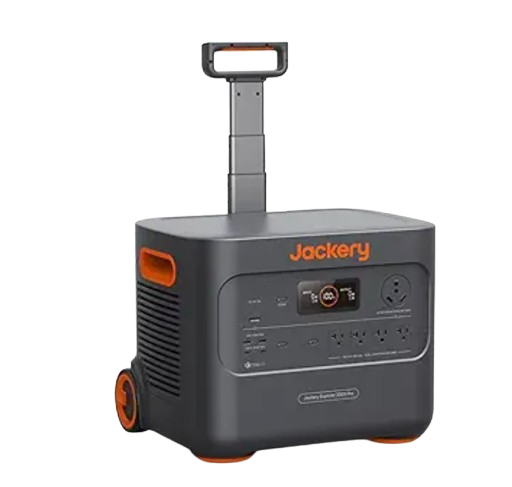
Jackery Explorer 3000 Pro
- Battery Capacity: 3,024Wh (expandable to 12kWh)
- Output Power: 3,000W (6,000W surge)
- Battery Type: Lithium-ion (2,000 cycles)
- Solar Input: 1,200W max
- AC Charging Speed: ~2.4 hours
- Connectivity: Bluetooth App Only
- Weight: 63.9 lbs
- Expandability: Battery expansion supported
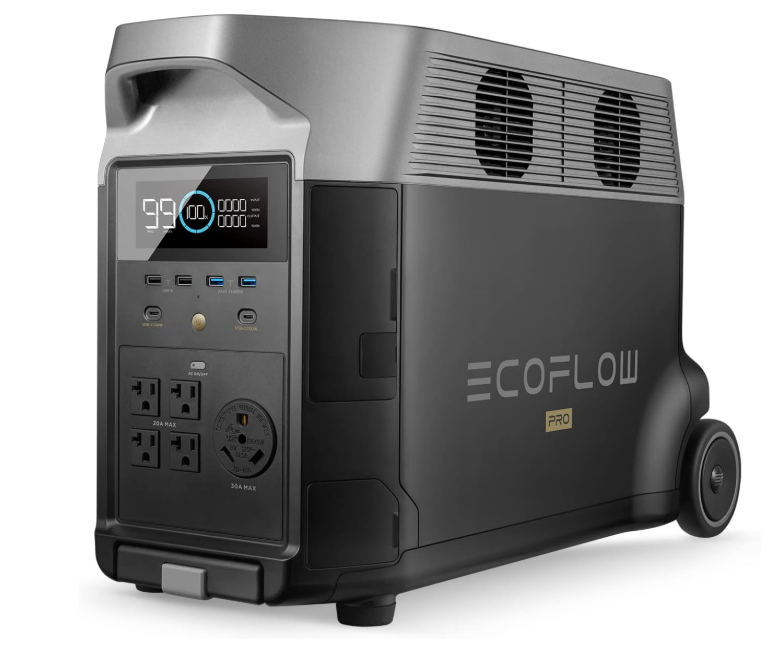
EcoFlow Delta Pro
- Battery Capacity: 3,600Wh (expandable up to 25kWh)
- Output Power: 3,600W (7,200W surge)
- Battery Type: LiFePO4 (3,500+ cycles)
- Solar Input: 1,600W max
- AC Charging Speed: ~1.8 hours
- Connectivity: WiFi + Bluetooth App
- Weight: 99 lbs
- Expandability: Smart Home Panel, Extra Batteries
Winner is EcoFlow Delta Pro
While Jackery is lighter and more portable, EcoFlow wins this battle thanks to its higher output, faster charging, longer battery lifespan (LiFePO4), and more robust ecosystem especially if you’re looking for a home backup or off-grid powerhouse.
2
Best Compact Power Station
EcoFlow Delta 2 vS Jackery Explorer 1000 V2
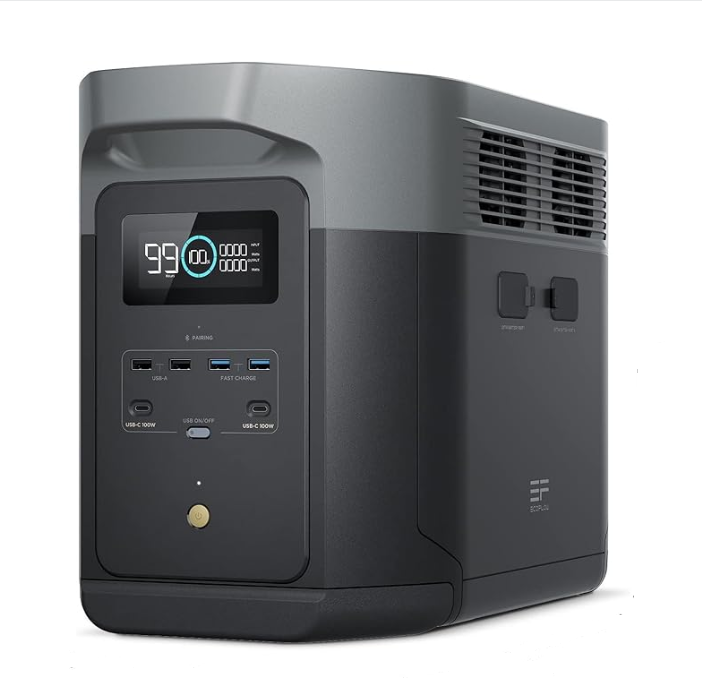
EcoFlow Delta 2
- Battery Capacity: 1,024Wh
- Output Power: 1,800W (surge 2,700W)
- Battery Type: LiFePO4 (3,000 cycles)
- Solar Input: 500W max
- AC Charging Speed: 0–100% in ~1.3 hours
- Connectivity: WiFi + Bluetooth App
- Weight: 27 lbs
- Expandability: Compatible with extra battery
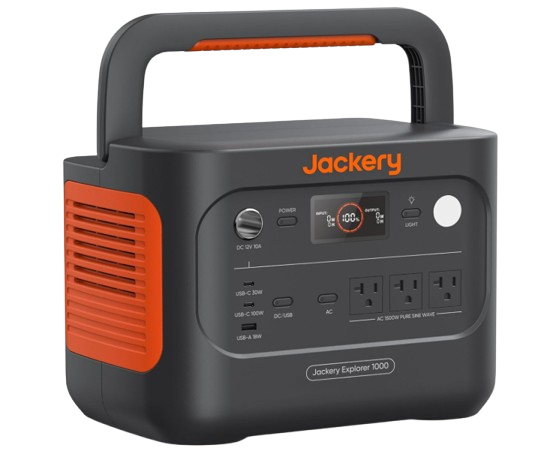
Jackery Explorer 1000 V2
- Battery Capacity: 1,264Wh
- Output Power: 2,000W (surge 4,000W)
- Battery Type: Lithium-ion (2,000 cycles)
- Solar Input: 600W max
- AC Charging Speed: ~1.8 hours
- Connectivity: Bluetooth App
- Weight: 22 lbs
- Expandability: No expansion
Winner Is EcoFlow Delta 2
Although the Jackery offers slightly more capacity and higher output, Delta 2 dominates with its superior battery chemistry (LiFePO4), faster charging, and expandability. It’s a smarter long-term investment especially for off-grid or daily use.
3
Best Expandable Power System
ecoflow delta 2 max vS jackery 2000 plus
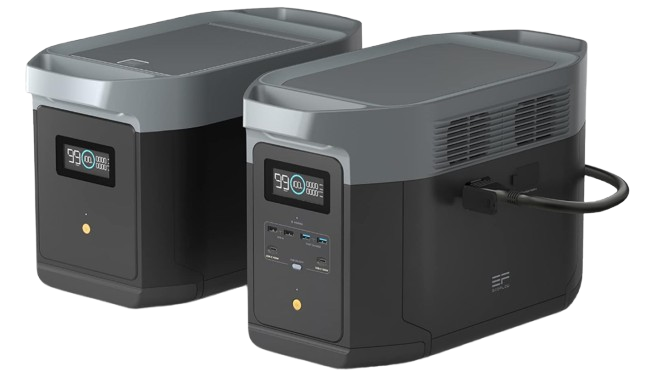
EcoFlow Delta 2 Max
- Battery Capacity: 2,048Wh (expandable up to 6,144Wh)
- Output Power: 2,400W (4,800W surge)
- Battery Type: LiFePO4 (3,000+ cycles)
- Solar Input: 1,000W max
- AC Charging Speed: ~1.1 hours (dual input)
- Connectivity: WiFi + Bluetooth App
- Weight: 50 lbs
- Expandability: Extra Batteries
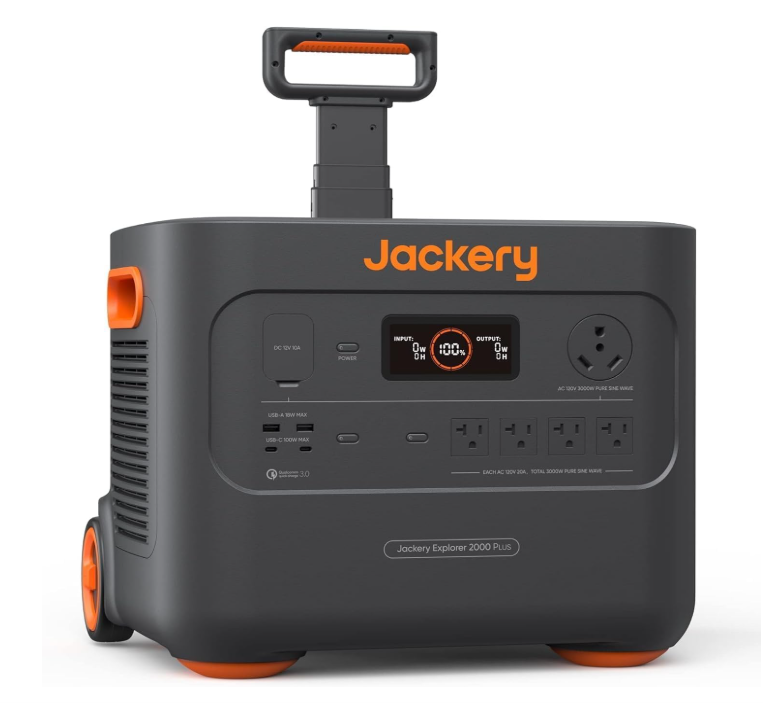
Jackery Explorer 2000 Plus
- Battery Capacity: 2,042Wh (expandable to 24kWh)
- Output Power: 3,000W (6,000W surge)
- Battery Type: LiFePO4 (4,000 cycles)
- Solar Input: 1,200W max
- AC Charging Speed:~2 hours
- Connectivity: Bluetooth App
- Weight: 61.5 lbs
- Expandability: Modular Expansion Packs
Jackery Explorer 2000 Plus
This one’s close, but Jackery takes the lead with a higher output, more scalable expandability, and better battery cycle life. It’s a strong pick for growing energy needs, including RV setups, backup power, or semi-off-grid systems.
Feature-by-Feature Comparison
- Battery Chemistry
EcoFlow Uses LiFePO4 (LFP) in most newer models, including the Delta 2 and Delta Pro. This chemistry offers 3,000 to 6,000 charge cycles, meaning the battery can last up to 10 years or more if used daily. It’s also more thermally stable, reducing fire risk.
Jackery Still uses Lithium-Ion NMC in most units, with around 500–1,000 cycles. These are lighter and more compact, which makes them great for short trips or occasional use, but they degrade faster under heavy use.
- Power Output & Surge Capacity
EcoFlow Most units offer higher continuous wattage and larger surge capacity for example, the Delta Pro can handle 3,600W (7,200W surge). This means it can run large appliances like fridges, microwaves, and even AC units.
Jackery The Explorer 3000 Pro maxes out at 3,000W (6,000W surge). It’s powerful, but slightly behind EcoFlow’s top-tier units when it comes to surge headroom.
- Solar & AC Charging Speed
EcoFlow Known for industry-leading input wattage the Delta Pro, for example, supports up to 1,600W solar and 1,800W AC input, recharging in as fast as 1.8 hours. Great for frequent use and minimal downtime.
Jackery Offers decent solar support (up to 1,200W on some models), but charging times are slower. The Explorer 1000 V2, for example, takes about 1.7–2 hours AC, but with solar it’s more limited.
- Ports & Expandability
EcoFlow Packs in more variety multiple AC ports, USB-C, Anderson, and regulated 12V outputs. Also supports Smart Panels and EV hookups, making it home-backup ready.
Jackery Focuses on simplicity and portability. The newer models are more expandable (e.g., 1000 Plus & 2000 Plus), but still not as modular or versatile as EcoFlow.
- Smart App & Monitoring Features
EcoFlow Offers a slick app with WiFi + Bluetooth support, remote control, real-time input/output data, and firmware updates. Perfect for tweaking settings while camping or during an outage.
Jackery Recently launched app support for newer Plus models, but it’s still limited in control and connectivity.
Real-World Scenarios: Who Wins?
- For RV Living
EcoFlow wins for high-power RVs and long trips due to power and expandability.
- For Camping
Jackery wins for its lighter weight, intuitive design, and ease of use.
- For Home Backup
EcoFlow + Smart Home Panel = powerful off-grid or outage solution.
- For Power Tools or Emergency
EcoFlow’s surge capacity and faster charging give it the edge here.
ECOFLOW Pros & Cons
Pros
- Higher power output and surge handling
- LiFePO4 battery with longer lifespan
- Fastest charging in its class
- More ports and features
cons
- Heavier and pricier
JACKERY Pros & Cons
Pros
- Lightweight and beginner-friendly
- Good performance for most common needs
- Clean design and UI
- Strong customer support
cons
- Slower charging and fewer smart features
- Customer Support & Warranty

EcoFlow 5-year warranty on Delta Pro and Delta 2 Max

Jackery 2–5 years depending on model
Both offer strong support and growing communities.
- Final Verdict: Which One Should You Buy?
If you need raw power, fast charging, and long battery life, EcoFlow is the clear winner. It’s ideal for RVers, home backup, and heavy-duty users.
If you want portability, simplicity, and reliability, Jackery is still an excellent choice especially for camping and light to moderate use.
Share
